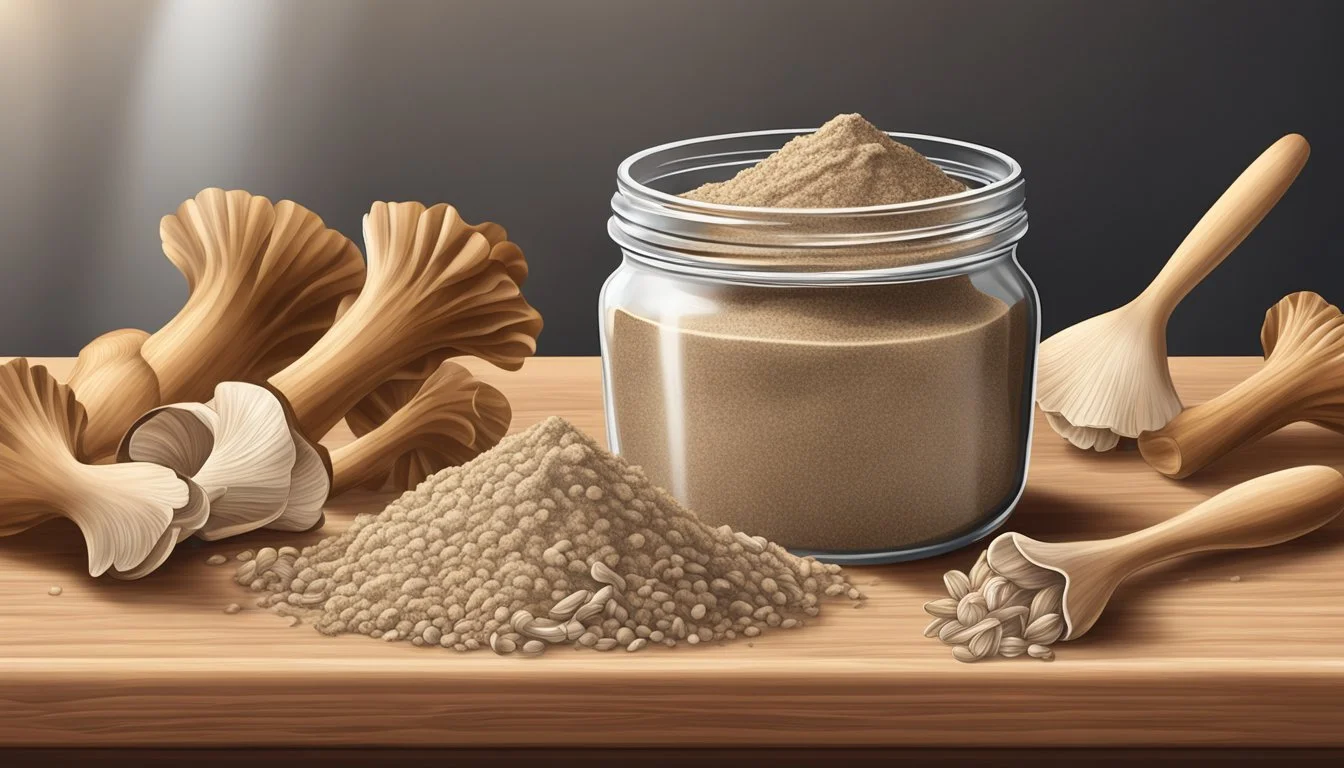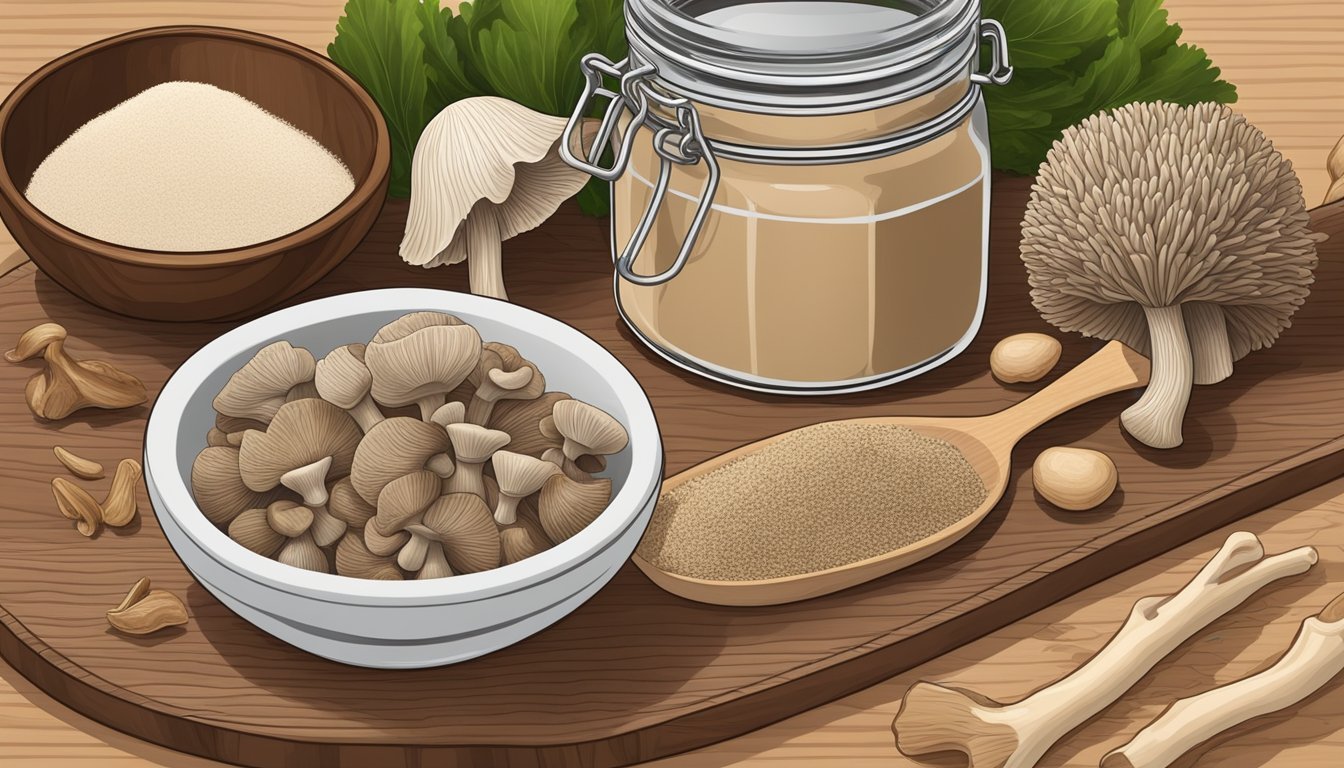Maitake Mushroom Powder Substitutes
Top Alternatives for Cooking and Health
Maitake mushroom powder has gained popularity for its earthy flavor and purported health benefits, making it a staple in many kitchens. However, finding this unique ingredient can sometimes be problematic. For those moments when maitake mushroom powder is unavailable, there are several viable substitutes that can deliver similar flavors and textures to your dishes.
One excellent option is shiitake mushroom powder, known for its rich umami taste and myriad health benefits, including potential anti-inflammatory properties. Oyster mushroom powder is another substitute that closely mimics the mild, smooth flavor profile of maitake mushrooms, making it suitable for a variety of recipes. Specialty options like dried truffle powder can also be used, offering a nutty and earthy flavor that enhances gourmet dishes.
Each substitute offers a unique taste and texture, ensuring that dishes remain flavorful and balanced even without maitake mushrooms. Whether it's for a stir-fry, soup, or sauce, these alternatives can step in effortlessly, keeping your culinary creations on track without compromising on taste or nutrition.
Understanding Maitake Mushrooms
Maitake mushrooms, also known as hen of the woods, are a culinary and nutritional delight. They originate from East Asia and are valued for their earthy flavor, rich texture, and numerous health benefits.
Characteristics and Flavor Profile
Maitake mushrooms are notable for their frilly, clustered appearance, resembling the ruffled feathers of a hen, hence the name "hen of the woods." Their unique taste combines an earthy flavor with subtle hints of nuttiness and meatiness. This rich taste allows them to stand out in various dishes, whether as the main ingredient or a complementary flavor. When cooked, they develop a pleasant tenderness and slightly crisp edges.
Health Benefits and Nutritional Value
Maitake mushrooms are packed with essential nutrients that contribute to overall health. They contain beta-glucans, known for boosting the immune system. Additionally, they offer a significant amount of vitamin D, fiber, and minerals such as potassium, copper, and iron. Low in calories yet high in protein, these mushrooms are excellent for maintaining a balanced diet. Their consumption has been linked to improved heart health and better digestion, making them a valuable addition to health-conscious diets.
Culinary Uses
Maitake mushrooms are versatile in the kitchen. They can be used in a variety of dishes, including soups, stews, sauces, stir-fries, and risotto. Their rich flavor profile makes them a favorite for grilling, where they develop a deep, smoky taste. Because they absorb flavors well, they can complement and enhance numerous recipes. Their ability to retain a firm yet tender texture when cooked makes them an excellent meat substitute in vegetarian dishes.
Common Maitake Mushroom Substitutes
When looking for substitutes for maitake mushrooms, it's crucial to consider the flavor and texture that best replicate the maitake's woodsy taste and tender bite. Here are some of the most common alternatives:
Shiitake Mushrooms
Shiitake mushrooms are a top choice for replacing maitake mushrooms. They have a rich, savory flavor with a strong umami profile that can enhance a wide range of dishes. Their texture is slightly firmer than maitake, which makes them suitable for soups, stews, and even sautés.
Fresh or dried shiitake mushrooms can be used, offering flexibility in recipes. They absorb other flavors well, making them an excellent substitute for maitake in complex dishes. When using them, it’s typically a one-to-one ratio, so one cup of shiitake replaces one cup of maitake.
Portobello Mushrooms
Portobello mushrooms possess a meaty texture that makes them another viable substitute for maitake mushrooms. Their robust and earthy flavor can stand up well in hearty dishes, such as grilled items or sandwiches. Often used in vegetarian and vegan recipes as a meat substitute, portobello mushrooms bring a similar satisfying mouthfeel to dishes as maitake.
Due to their large size, they can be sliced or diced to mirror the appearance of maitake mushrooms. They work particularly well in grilled recipes where you want a smoky flavor to complement the dish.
Oyster Mushrooms
Oyster mushrooms have a delicate, slightly sweet flavor and a texture that becomes tender when cooked. This makes them a good stand-in for maitake mushrooms in stir-fries and sautéed dishes. They can also be grilled, giving them versatility in many culinary applications.
The ease of finding oyster mushrooms in grocery stores adds to their appeal as a maitake substitute. Their petals-like form allows them to mimic the appearance of maitake, and they absorb sauces and marinades well, enhancing their taste in various recipes.
Porcini Mushrooms
Porcini mushrooms are known for their strong, nutty flavor and distinctive aroma. When dried and rehydrated, they offer a concentrated flavor that can elevate soups, stews, and sauces, making them an ideal substitute for maitake mushrooms in these dishes.
Porcini mushrooms need to be used in moderation because of their intense flavor. A little goes a long way when incorporating them into recipes. They are particularly excellent in risottos and pasta dishes where their robust taste can shine. Indulge in porcini mushrooms for a gourmet touch that brings depth to your culinary creations.
Alternative Mushroom Substitutes
Several mushroom varieties can serve as excellent substitutes for maitake mushrooms, each offering unique flavors and textures that complement various dishes. The following options are particularly noteworthy for their applicability in soups, salads, and sauces.
Chanterelle Mushrooms
Chanterelle mushrooms are renowned for their delicate, fruity, and slightly peppery flavor. This distinctive taste makes them an excellent choice for replacing maitake mushrooms in recipes that require a subtle but rich flavor profile.
They have a firm and meaty texture, which holds up well in various cooking methods. Chanterelles work wonderfully in sauces, soups, and salads. When using chanterelles as a substitute for maitake mushrooms, they provide a similar culinary experience with a unique twist.
Cremini Mushrooms
Cremini mushrooms, also known as crimini mushrooms, are a versatile substitute for maitake mushrooms. They have a deeper, earthier flavor compared to button mushrooms, making them a suitable replacement in dishes that benefit from a more robust taste.
Their slightly firmer texture ensures they hold up well during cooking. Cremini mushrooms are great in soups, stews, and casseroles. They provide a similar heartiness to maitake mushrooms and are readily available, making them a practical alternative.
Enoki Mushrooms
Enoki mushrooms, with their slender, long stalks and small caps, offer a unique texture that can replace maitake mushrooms in various recipes. They have a mild, slightly sweet flavor that absorbs other flavors well, making them ideal for salads and soups.
Their crunchy texture adds a different dimension to dishes. Enoki mushrooms are especially useful in Asian cuisine and can be used fresh or cooked. They are a great way to add both texture and mild savory flavor to your recipes as a maitake mushroom substitute.
Non-Mushroom Alternatives
For those seeking non-mushroom alternatives to Maitake mushroom powder, several options offer unique flavors and nutritional benefits. These alternatives can be incorporated into various dishes, providing a satisfying and comparable taste and texture.
Tofu and Tempeh
Tofu and tempeh are popular plant-based substitutes known for their versatility and nutritional benefits. Tofu, made from soybeans, has a neutral flavor and can absorb the flavors of other ingredients in stir-fries and soups. Its soft, sometimes slightly firm texture makes it an excellent replacement for mushrooms in many dishes.
Tempeh, also derived from soybeans, has a firmer texture and a nutty flavor. It contains more fiber and protein than tofu. Tempeh is fermented, which adds a unique and hearty taste that can mimic that of mushrooms when sliced and sautéed. Both tofu and tempeh are suitable for vegan and vegetarian diets, making them excellent options for those avoiding mushrooms.
Legumes and Grains
Legumes such as garbanzo beans (chickpeas) and lentils offer an earthy flavor and meaty texture similar to mushrooms. Garbanzo beans can be roasted or sautéed to add a chewy consistency to dishes. They are rich in protein and fiber, making them nutritious substitutes ideal for soups, stews, and stir-fries.
Lentils are another excellent choice, with a variety of types (green, brown, red) that can be used depending on the desired texture. They provide a hearty base for many recipes and can be flavored with spices to enhance their taste, making them a solid substitute for maitake mushroom powder in flavorful dishes.
Vegetable Options
Certain vegetables can also serve as viable substitutes. Zucchini and eggplant are two vegetables with a firm texture that works well in place of mushrooms. Zucchini can be sliced and sautéed, adding a light flavor and tender yet slightly crisp texture to dishes.
Eggplant, known for its meaty consistency, can be roasted, grilled, or sautéed to achieve a satisfying taste similar to that of cooked mushrooms. Both vegetables are versatile and can be used in various culinary applications, providing an excellent texture and flavor for those looking for non-mushroom alternatives.
Preparation and Cooking Tips for Substitutes
When using substitutes for maitake mushroom powder, it's crucial to know how to adapt them to different recipes and how to enhance their flavors with the right seasoning.
Adapting Substitutes to Recipes
Different substitutes bring unique flavors and textures, requiring careful adaptation in recipes. King oyster mushrooms offer a milder taste but caramelize well when sautéed, making them an excellent choice for dishes that benefit from a crisp texture.
Shiitake mushrooms are another worthy alternative due to their earthy and robust flavor. They work well when grilled or marinated to bring out their umami qualities.
Consider using chanterelles for a fruity, peppery taste in stews or sauces. They maintain their firm texture, offering a satisfying bite.
Seasoning and Flavor Enhancements
To maximize the flavor of mushroom substitutes, seasonings can play a significant role. Thyme and black pepper complement the earthy notes of mushrooms. A sprinkle of nutritional yeast or MSG can enhance umami depth, particularly in soups or gravies.
Marinating the mushrooms with ingredients like soy sauce, sesame oil, and garlic gives them a richer taste. For those looking to recreate the nutty flavor of maitake, try roasting or grilling the substitutes at high temperatures to bring out those qualities.
Using creative techniques and the right seasoning ensures that substitutes can closely mimic the distinct flavor profile of maitake mushroom powder in various dishes.
Whether sautéed, grilled, or marinated, these tips will help in achieving an optimal taste and texture with different mushroom substitutes.
Where to Find and Buy Substitutes
When looking to find and buy substitutes for maitake mushroom powder, there are several options available.
Grocery Stores
Local grocery stores often carry various mushroom varieties in their fresh produce section. Shiitake, cremini, and oyster mushrooms are common. For convenience, some stores also sell mushroom powder, which can serve as an excellent substitute.
Online Retailers
Online platforms such as Amazon and specialty food websites offer a wide range of dried and canned mushrooms. Brands offering high-quality substitutes for maitake mushroom powder include MycoTerra, Frontier Co-op, and Om Mushrooms.
Specialty Stores
Health food stores and Asian markets are reliable places to find both fresh and dried mushroom alternatives. These stores usually have a more extensive selection, including rare varieties like chanterelles and enoki mushrooms.
Farmers' Markets
Local farmers' markets can be a hidden gem for finding fresh, organic mushroom alternatives. Vendors often sell seasonal and locally sourced mushrooms, which can be used as substitutes.
Subscription Services
Mushroom subscription boxes such as Mushroom Box provide monthly deliveries of fresh or dried mushrooms. This can be an excellent way to explore different types of mushrooms that can replace maitake powder.
By exploring these various options, you can easily find suitable substitutes for maitake mushroom powder.
Health Considerations
Considerations for allergies, sensitivities, and dietary needs are crucial when substituting Maitake mushroom powder with other options. Sensitivities to mushrooms can lead to allergic reactions, and nutritional profiles should match dietary goals.
Allergies and Sensitivities
Mushroom allergies are relatively rare but can cause significant reactions. Symptoms include skin rashes, itching, swelling, and gastrointestinal issues. Those with a known mushroom allergy should avoid substitutions like shiitake and chanterelles, as they share common allergens with Maitake mushrooms.
Cross-reactivity between different mushroom species is possible. It's essential to test small amounts if trying a new substitute. Individuals with mold allergies might also react adversely to mushrooms due to similar fungal proteins.
Dietary and Nutritional Concerns
Maitake mushroom powder offers considerable nutritional benefits. With 1.4 grams of protein per cup, it supports muscle maintenance and repair. It’s also rich in minerals like copper and vitamin B5, beneficial for immune system function and skin health.
Substitutes like shiitake or crimini should mirror these nutritional qualities. They should be rich in vitamins and provide similar protein content. Always consider dietary preferences like vegan and vegetarian diets when choosing alternatives.
For those focused on reducing inflammation or enhancing gut health, selecting mushroom substitutes with anti-inflammatory properties is crucial. Look for options recognized for their medicinally beneficial compounds, which can aid in cancer prevention and overall disease resistance.
The Role of Maitake in Traditional and Modern Medicine
Maitake mushrooms, also known as "Hen of the Woods," have played a significant role in both traditional East Asian medicine and modern scientific research. They are esteemed for their health benefits, including their ability to support the immune system and potential anti-cancer properties.
Historical and Cultural Significance
Maitake mushrooms are native to northern Japan and parts of China. They have been used in traditional medicine for centuries. Ancient Chinese and Japanese cultures valued these mushrooms not only as a delicious food but also as a potent medicinal ingredient.
In traditional East Asian medicine, maitake was utilized to boost the immune system and treat a variety of ailments. Known for its robust, meat-like texture and earthy flavor, maitake was thought to enhance vital energy and reduce inflammation. Traditional practitioners often prescribed maitake for conditions such as arthritis and to aid in fighting off infections.
Modern Research and Potential Benefits
Modern scientific research has corroborated many of the traditional uses of maitake mushrooms. Studies have concentrated on their bioactive components, particularly beta-glucans, which are known to modulate the immune system. Research indicates that maitake mushrooms may have antitumor, immunomodulatory, and antioxidant properties.
Clinical trials have shown promise in using maitake for lowering blood pressure and cholesterol levels. Moreover, their potential in cancer treatment has been a significant focus, with some studies suggesting that maitake extracts can inhibit tumor growth and enhance the efficacy of chemotherapy.
Its dense nutrient profile includes polysaccharides, phenolic compounds, and amino acids. Maitake is increasingly being incorporated into modern medicinal practices, emphasizing its broad spectrum of health benefits.









